Nigeria is grappling with an unprecedented fuel crisis, as petrol prices skyrocket above N1,000 per liter at filling stations nationwide, despite official claims of a capped price of N855. The scarcity of the essential commodity has left citizens stranded and frustrated, exacerbating the already dire economic situation. In this special report, Africa Health Report correspondent Korede Abdullah delves into the root causes of the fuel scarcity and price hike and examines the far-reaching consequences for Nigerians.

A critical look at the unfolding issues around the Nigerian petroleum sector seems to lay bare the government’s perceived insincerity and failure to address the crisis. Unfortunately, this has plunged the country into deeper hardship and despair.
Nigerians face hardship
Nigerians are facing unprecedented hardship as the pump prices of Premium Motor Spirit, also known as petrol, continue to soar above N1,000/litre in filling stations across the country despite the speculations that the official price is N855. The situation has been exacerbated by the scarcity of the commodity, leaving many citizens stranded and frustrated.
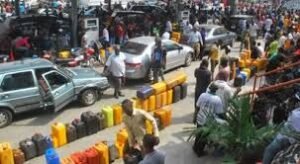
The cost of petrol in private depots has been increased to between N920 and N950/litre, further fuelling the crisis. This has resulted in long queues at filling stations, with many Nigerians spending hours waiting to buy fuel. The situation has left workplaces in a shadow of itself. The Federal Secretariat in Abuja, for instance is a ghost place presently, as civil servants skip work because of high cost of transportation fares.
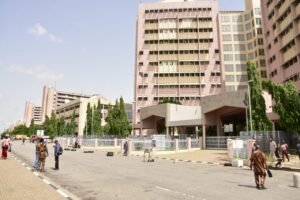
The scarcity has also led to a surge in the prices of transportation, food, and other essential commodities.
Many Nigerians who spoke with Africa Health Report lamented the economic hardship in the country which they said has been exacerbated by the high cost of fuel, with attendant ripple effect on the prices of goods and services.
Yesterday, Tuesday September 10, some civil servants in Abuja were observed lamenting the high cost of transportation. A civil servant who spoke to AHR complained that commuting to work has become challenging in the country. He said that the cost has jumped by over 300 per cent forcing workers to skip work. He further said that with the hiked petrol price the burden has been transferred to the commuters.
He said for a journey that previously cost N500, it now costs N1500, coming from Mararaba (Abuja suburb) to the city. He argues that while the cost of transportation has jacked up, salaries have remained unchanged.
Millions of Nigerians are struggling to make ends meet, and the government’s failure to provide adequate relief measures has only added to their woes
The newspaper gathered that the scarcity has led to a shortage of food and other essential commodities, as transportation costs have become prohibitive.
Last week Monday, a group of protesters took to the streets of Abuja, demanding the immediate dismissal of the Group Managing Director of the Nigerian National Petroleum Corporation Limited, Mele Kyari.
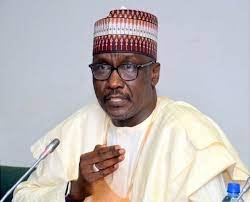
The protesters blamed Kyari for the lingering fuel scarcity, which they said has caused untold hardship for Nigerians.
The protesters carried placards and banners, chanting slogans and demanding action from the government. They called on the government to address the fuel scarcity and reduce the pump prices of petrol. The protest was peaceful, but it highlighted the growing frustration among Nigerians.
IMF revelations
According to the International Monetary Fund (IMF), the Nigerian government has partially reversed its decision to eliminate fuel subsidies. This move came as the country grappled with a severe cost of living crisis.

Initially, President Bola Tinubu had vowed to scrap fuel subsidies upon taking office in May 2023, leading to a doubling of fuel prices at the pump.
However, the subsequent surge in inflation and currency woes might have forced the government to reconsider its stance, despite the fact that there has never been any official statement to that effect.
In an effort to mitigate the impact of rising fuel prices on citizens, the government has surreptitiously reintroduced subsidies, according to IMF revelations.
The policy reversal, as the organization said, aimed to cushion consumers from the effects of price increases.
The IMF warned that the move could have significant economic implications, potentially costing up to 3% of Nigeria’s GDP in 2024. The reintroduction of subsidies may provide temporary relief to citizens, but it may also undermine the government’s long-term economic goals.
Dr Oluwatosin Yusuf, an economist, who spoke with our correspondent said the reversal of the fuel subsidy might have been informed by the desperation of the government alleviate the hardship in the country.
“The challenges faced by the Nigerian government in balancing economic reform with social welfare is what we are witnessing in the policy reversal.”, Yusuf said.
Not yet Uhuru for poor Nigerians
Renowned Nigerian economist, Mr. Bismarck Rewane, gave a warning last week at an event in Lagos that the recent 50.1% increase in petrol prices, will have far-reaching consequences for Nigerian consumers.
According to Rewane, the price hike will transfer a staggering N5 trillion from consumers to the government, exacerbating energy poverty in the country.
Rewane, who is also the CEO of Financial Derivatives Company Limited (FDC), projected that the number of Nigerians trapped in energy poverty will rise to 168 million in 2025, up from 161 million in 2023.
This stark prediction from the economist paints the grim impact of the price increase on the most vulnerable members of society.
Government’s silence on IMF statement
The Nigerian government’s silence on the International Monetary Fund’s (IMF) claims has left citizens in a state of uncertainty. The IMF alleged that despite the government’s declaration of fuel subsidy removal, billions of naira are still being paid in subsidies, yet fuel prices continue to rise.
This revelation has sparked widespread confusion and scepticism among Nigerians, who are struggling to make sense of the government’s unclear policies.
As the government remains mum on the issue, Nigerians are left to wonder about the truth behind the IMF’s claims. Are they still paying subsidies, and if so, why?
The lack of transparency and accountability has fuelled suspicions of corruption and mismanagement of the money saved from the subsidy, further eroding trust in the government.
With fuel prices showing no signs of decreasing, Nigerians are bearing the brunt of the government’s unclear policies, and the silence is only adding to their frustration.
Insincerity on the part of government
The Nigerian federal government has been accused of insincerity regarding the removal of fuel subsidies. Despite claims of subsidy removal, Africa Health Report has discovered that the government still pays billions of naira in subsidies, yet fuel prices remain unaffordable for many Nigerians.
This discrepancy raises questions about the government’s transparency in managing the oil sector. The continued payment of subsidies suggests that the government may not have fully removed the subsidy as claimed, leaving many to wonder where the funds are being allocated.
The government’s secrecy surrounding the oil sector has long been a subject of concern for Nigerians. The lack of transparency has led to suspicions of corruption and mismanagement of funds, further exacerbating the country’s economic woes.
As fuel prices continue to soar, Nigerians are left to bear the brunt of the government’s unclear policies.
Tinubu’s Volte-face
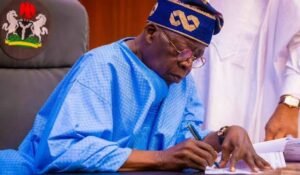
Some Nigerians who were interviewed by Africa Health Report correspondent expressed outrage and disappointment over President Bola Tinubu’s decision to remove fuel subsidies, a move that has sparked memories of his vocal opposition to the same policy during the Goodluck Jonathan administration in 2012.
At the time, Tinubu, then a leading opposition figure, had joined forces with other political opponents to stage massive protests against the subsidy removal, decrying it as an attack on the common man.
Fast forward to 2023, and Tinubu, now President, has made the removal of fuel subsidies one of his first acts in office.
This sudden about-face has left many questioning the sincerity of his previous stance and accusing him of hypocrisy.
Critics argue that Tinubu’s actions demonstrate a lack of principle and a willingness to adopt policies he once vehemently opposed, simply because they are now politically expedient.
The removal of fuel subsidies has already led to a significant increase in fuel prices, sparking widespread discontent among Nigerians who are struggling to make ends meet.
Many are now wondering why Tinubu was so opposed to the policy when it was proposed by Jonathan, yet saw fit to implement it himself upon taking office.
The move has also raised questions about the true motivations behind Tinubu’s political actions and whether he is truly committed to serving the interests of the Nigerian people.
As the controversy continues to simmer, Nigerians are calling on President Tinubu to explain the reasoning behind his sudden change of heart on fuel subsidies.
With the country already grappling with economic hardship and widespread discontent, the President’s actions have only added fuel to the fire, leaving many to wonder what other surprises his administration has in store for them.
Informal sector worst hit
Nigeria’s informal sector, comprising small-scale businesses, has been severely impacted by the recent increase in fuel prices.
According to Mr Ebenezer Oluwatoyin a business owner at Iyana-Ipaja, Lagos, the hike in fuel prices has crippled many businesses, leading to a surge in poverty levels across the country.
“With fuel prices skyrocketing, business owners are now struggling to cope with the increased costs of operating their enterprises. This has forced many to shut down their operations.” Oluwatoyin said.
The situation is particularly dire in areas with epileptic power supply, where business owners rely heavily on generators to power their operations. With fuel prices now out of reach, many have been forced to close their shops, leaving them without a source of income.
This has had a devastating impact on the livelihoods of these entrepreneurs and their families, pushing them further into poverty.
The closure of these small-scale businesses has also had a ripple effect on the broader economy, leading to a decline in economic activity and a rise in unemployment.
Experts warn that if the situation is not addressed, it could have long-term consequences for Nigeria’s economic growth and development.
The government has said it’s under pressure to find a solution to the fuel price crisis and provide support to small-scale businesses to prevent further economic hardship. Oluwatoyin told the newspaper that no life-line has come.
Poor Nigerians bearing the burden
Even with the highly-publicized launch of Dangote’s refinery, Nigerian households continue to struggle with exorbitant prices of cooking gas and kerosine.
A recent investigation by Africa Health Report reveals that the cost of cooking gas remains out of reach for many, with prices ranging from N1,100 to N1,350 per kilogram depending on locations.
The situation is further exacerbated by the skyrocketing cost of kerosine, which was once the most affordable cooking fuel option for low-income households. A liter of kerosine now sells for between N1,800 to N2,000, surpassing the cost of cooking gas.
This has drained the scarce resources of Nigerians, forcing many to seek alternative and often hazardous cooking methods.
Mrs Latifah Akinola, a Lagos resident housewife told this correspondent that charcoal has become the go-to cooking fuel for her household, as they can no longer afford the high prices of gas and kerosine.
This shift to the use of charcoal has become the lot of many people who spoke with the newspaper, with significant implications for public health, as charcoal smoke is a known contributor to respiratory diseases and indoor air pollution.
With the country’s economy already struggling, the burden of expensive cooking fuels has become an unsustainable weight on the shoulders of Nigerian households.
Calls on President Tinubu to reduce fuel prices
Many Nigerians are urging President Tinubu to announce a reduction in fuel prices in order to alleviate the economic hardship gripping the country.
The removal of fuel subsidies was one of the issues that sparked widespread protests in August. There are growing calls for reversal, as citizens struggle to cope with the increased financial burden.
Despite promises of palliatives to cushion the impact, many argue that these measures do not trickle down to the poor and vulnerable segments of society.
President Tinubu’s failure to address this concern has only added to the growing frustration and discontent among Nigerians. As the situation continues to deteriorate, many fear that further unrest and protests are inevitable if the president does not listen to the cries of the people.
As tensions continue to simmer, Nigerians are calling on President Tinubu to take immediate action to address the fuel price issue. Failure to do so, they warn, will only fuel further unrest and protests, potentially destabilizing the country.

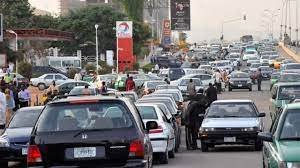

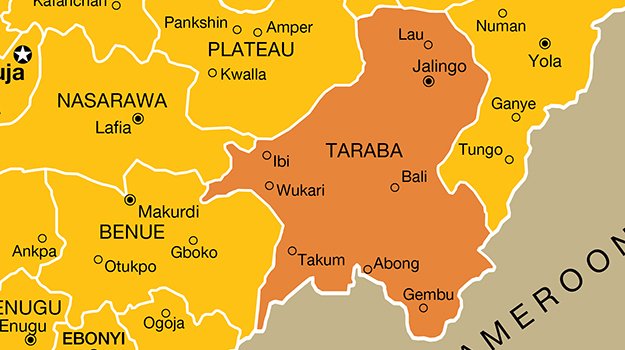
Simply Sseven Nice post. I learn something totally new and challenging on websites